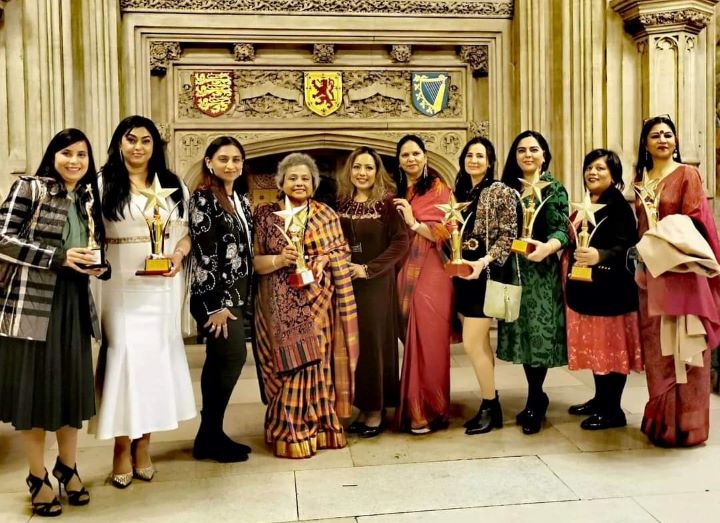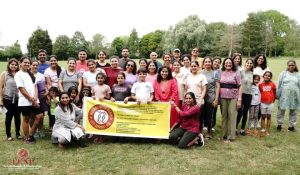

Women gather for the She Inspires Awards at the British Parliament
London: As the Indian diaspora witnesses monumental changes in its profile and confidence across the world, Indian women stepping out of the country too reflect that change. The new generation of women settling in the UK come equipped with education and attitudinal understanding which makes them stand apart from the ones who migrated a generation earlier.
Despite the progress, Indian women in the diaspora still have to surmount challenges in a foreign land, some of which can be formidable.
India Narrative speaks with Rashmi Mishra of Inspiring Indian Women (IIW), an entity that she set up in 2016 in London to support women in the diaspora who faced assorted challenges – right from domestic abuse and hostile in-laws to lack of work opportunities and a non-existent social circle in an alien land.
Mishra says that one of her motivations to start IIW was to support well-qualified women who arrived on dependent visas and were looking for suitable work. “It was very frustrating for me as I had to get into ‘supply teacher work’ – where I would get teaching assignments only if a regular teacher went on leave. My long-term experience of teaching in India was not counted. Because of my experiences as an expat, I could understand the emotions of educated women who were engineers and IT professionals but could not find jobs in London”.
She began to connect women from the diaspora so that they leave behind the drudgery of their homes, find the right opportunities and do better in their personal and professional lives. Many women were able to hold exhibitions while others were happy to meet others women and share experiences.


Mishra also realised that she could not just stop at creating networking opportunities as diaspora women were facing other challenges like domestic abuse. “Lots of cases come up in London, therefore, we set up an online group called Sister Support where women ask and provide answers from their experiences related to domestic violence”.
Narrating an incident, she mentions how a woman who was “beaten up black and blue” by her husband bit him in self-defence. “The mother-in-law called up the police and the woman had to spend a night in jail for the assault. I took guarantee for her and got her out of jail but then she had nowhere to go. She did not want to go back to India to face her family and society”.
Mishra says she gets immense support from local authorities. “The Indian High Commission is very helpful. In this woman’s case, the high commission provided hotel accommodation for 10 days. Similarly, social systems here and the British authorities are supportive. The local council helped her and we got help from care workers”, she adds. Even as the legal case carries on, the woman is out of the toxic relationship and settled down in the UK.
Despite occasional hostile incidents at home, the diaspora is witnessing far-reaching changes. Mishra says dowry is going down among the Indians settled in the UK. “Now it has become an embarrassment to ask for it”.
IIW was registered as a company house entity as opposed to organisations existing only as WhatsApp and Facebook groups. Mishra says she has been filing accounts for the last eight years which has made the organisation transparent and accountable. “We do not take any money for personal gain. Our donations go entirely into activities. We have extended our work to underprivileged girls in Santa Cruz in Mumbai”, Mishra says.
She adds that a major achievement for IIW has been organising the She Inspires Awards in the British parliament to recognise the work of women.
“Member of Parliament, Bob Blackman hosts the awards under numerous categories. We honour mothers who have sacrificed their careers for their families and children. We felicitated a 75-year-old woman who was winding up her business. She had opened up the first ayurvedic store in the UK decades back. It was a great moment for her as well as her family”.
Now, IIW has extended the awards to include women in India, like Meenakshi Walke who promote unusual vocations like teaching bamboo art.
An active IIW member, Vini Kalia says that because of IIW Indian women have established newer networks and are in fact expanding those across the UK, adding that she also discovered newer skills and confidence within. Often, she finds herself holding meetings with officials as well as arranging logistics for IIW events.
On the other extreme, Sudha Rawat also corroborates that IIW helped her express her creativity. “I am interested in graphic designing and playing with photos and videos. It was through IIW that I got a platform to express my video-making skills”. Besides making videos, Rawat now spends her time organising events and getting other women into the fold.
Her husband, Ravi Rawat says that diaspora women are becoming achievers and getting recognition their families had not thought possible earlier. Adding a touch of humour he adds: “Now many of us feel jealous that the women are organising events at the parliament or the holding meetings at the Indian High Commission – something which even we had not done”.
The Border Security Force (BSF) Director General Daljit Chawdhary on Friday met with Union Home…
By Shailesh Yadav Google Gemini, the generative artificial intelligence tool of technology major Google, can…
Union Home Minister Amit Shah spoke with Chief Ministers on Friday and asked them to…
Raja Abid, Chairman of the Revolutionary Students Organisation, has condemned the deteriorating education system in…
Tibetans-in-exile in Shimla observed the 36th birthday of the 11th Panchen Lama, Gendhun Choekyi Nyima,…
Leaders of the Baloch Yakjehti Committee (BYC), currently held in Huda Jail in Quetta, have…